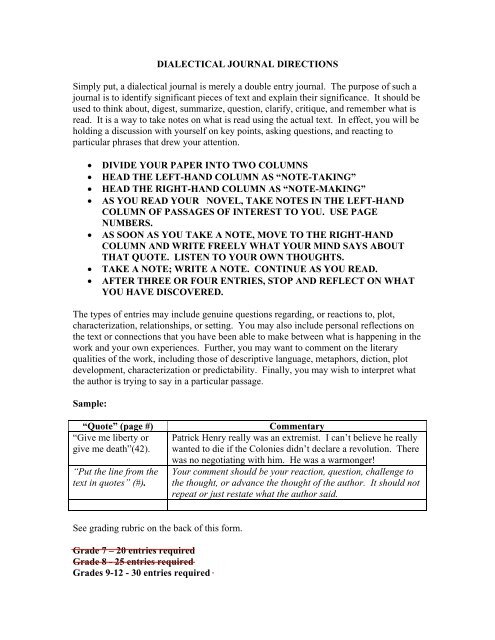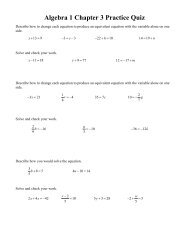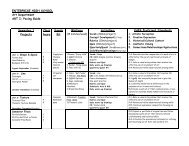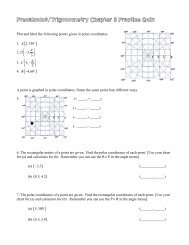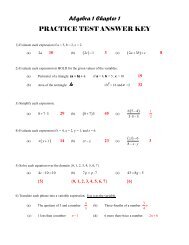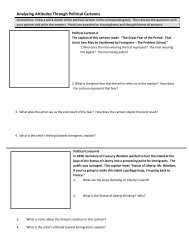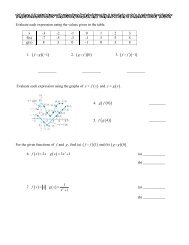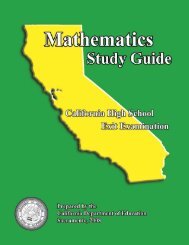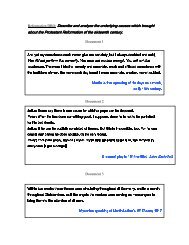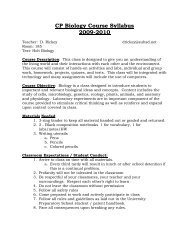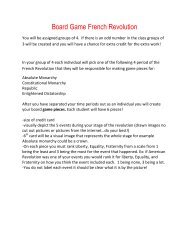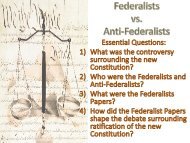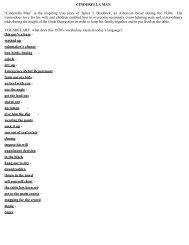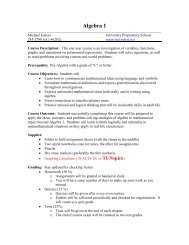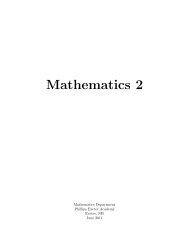DIALECTICAL JOURNAL DIRECTIONS
DIALECTICAL JOURNAL DIRECTIONS
DIALECTICAL JOURNAL DIRECTIONS
Create successful ePaper yourself
Turn your PDF publications into a flip-book with our unique Google optimized e-Paper software.
<strong>DIALECTICAL</strong> <strong>JOURNAL</strong> <strong>DIRECTIONS</strong><br />
Simply put, a dialectical journal is merely a double entry journal. The purpose of such a<br />
journal is to identify significant pieces of text and explain their significance. It should be<br />
used to think about, digest, summarize, question, clarify, critique, and remember what is<br />
read. It is a way to take notes on what is read using the actual text. In effect, you will be<br />
holding a discussion with yourself on key points, asking questions, and reacting to<br />
particular phrases that drew your attention.<br />
• DIVIDE YOUR PAPER INTO TWO COLUMNS<br />
• HEAD THE LEFT-HAND COLUMN AS “NOTE-TAKING”<br />
• HEAD THE RIGHT-HAND COLUMN AS “NOTE-MAKING”<br />
• AS YOU READ YOUR NOVEL, TAKE NOTES IN THE LEFT-HAND<br />
COLUMN OF PASSAGES OF INTEREST TO YOU. USE PAGE<br />
NUMBERS.<br />
• AS SOON AS YOU TAKE A NOTE, MOVE TO THE RIGHT-HAND<br />
COLUMN AND WRITE FREELY WHAT YOUR MIND SAYS ABOUT<br />
THAT QUOTE. LISTEN TO YOUR OWN THOUGHTS.<br />
• TAKE A NOTE; WRITE A NOTE. CONTINUE AS YOU READ.<br />
• AFTER THREE OR FOUR ENTRIES, STOP AND REFLECT ON WHAT<br />
YOU HAVE DISCOVERED.<br />
The types of entries may include genuine questions regarding, or reactions to, plot,<br />
characterization, relationships, or setting. You may also include personal reflections on<br />
the text or connections that you have been able to make between what is happening in the<br />
work and your own experiences. Further, you may want to comment on the literary<br />
qualities of the work, including those of descriptive language, metaphors, diction, plot<br />
development, characterization or predictability. Finally, you may wish to interpret what<br />
the author is trying to say in a particular passage.<br />
Sample:<br />
“Quote” (page #)<br />
“Give me liberty or<br />
give me death”(42).<br />
“Put the line from the<br />
text in quotes” (#).<br />
Commentary<br />
Patrick Henry really was an extremist. I can’t believe he really<br />
wanted to die if the Colonies didn’t declare a revolution. There<br />
was no negotiating with him. He was a warmonger!<br />
Your comment should be your reaction, question, challenge to<br />
the thought, or advance the thought of the author. It should not<br />
repeat or just restate what the author said.<br />
See grading rubric on the back of this form.<br />
Grade 7 – 20 entries required<br />
Grade 8 - 25 entries required<br />
Grades 9-12 - 30 entries required
Grading Dialectical Journals<br />
Quotations &<br />
Plot Details<br />
Level 4 (90 – 100<br />
points)<br />
Detailed, meaningful<br />
Level 3 (80 – 89<br />
points)<br />
Less detailed but still<br />
good<br />
Level 2 (70 – 79<br />
points)<br />
Few good details<br />
Level 1 (50 – 65<br />
points)<br />
Hardly and good<br />
details<br />
Interpretation<br />
Thoughtful, avoids<br />
clichés<br />
Intelligent, discusses<br />
theme<br />
Vague, unsupported,<br />
plot summary<br />
Plot summaries and<br />
paraphrases<br />
Literary<br />
Elements<br />
Questions and<br />
Connections<br />
Coverage of<br />
Text<br />
Discusses diction,<br />
imagery, syntax, etc<br />
and how these<br />
contribute to meaning<br />
Insightful, personal<br />
connections, thoughtprovoking<br />
questions<br />
Covers text<br />
thoroughly<br />
Includes them but<br />
doesn’t explain how<br />
they contribute to<br />
meaning<br />
Some personal<br />
connections,<br />
questions arise from<br />
text<br />
Covers important<br />
parts thoroughly<br />
Lists literary<br />
elements but little<br />
discussion of<br />
meaning<br />
Few connections,<br />
obvious question<br />
Covers most parts,<br />
but quickly<br />
Few literary<br />
elements, almost no<br />
discussion of<br />
meaning<br />
Few connections, no<br />
questions<br />
Way too short<br />
Presentation<br />
Neat, organized,<br />
looks professional,<br />
follows directions<br />
Neat and readable,<br />
follows directions<br />
Neat but hard to read,<br />
doesn’t follow<br />
directions<br />
Hard to read, doesn’t<br />
follow directions


